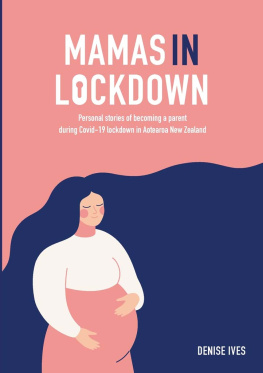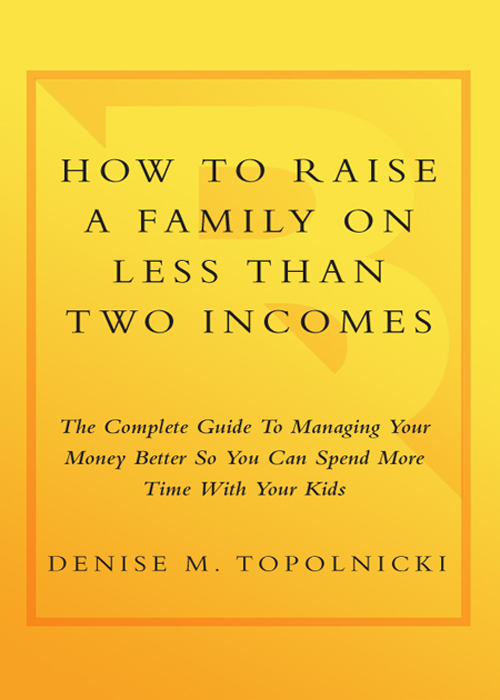Part
Four
CHAPTER 16
Give Up Paid Work Gracefully
N ow that youve read fifteen chapters on managing money, I hope youre confident that you and your spouse can raise your family on less than two incomes. I take up a completely different topic in the final chapters of this book. All three are about managing the career that youve chosen to put on hold for a while. Thats right, you cant stop thinking about what you used to do for money, not even when youre up to your eyeballs in unpaid work.
When youre home most or all of the time, you can easily get so caught up in domestic duties that you neglect your own need to keep learning. You cant get a baby-sitter in the middle of the day, so you turn down lunch invitations from your former coworkers. You have to help your son with his homework, so you dont have time to even read the newspaper anymore. Listen to Abby Zolnoski, a former city planner who quit her job after the birth of her daughter eight years ago. Abby stayed home until her daughter Ariel was in second grade. She didnt keep in touch with old colleagues, read trade publications, or maintain the computer skills that were so essential in her old job. She didnt even do volunteer work that might enhance her rsum. Not keeping up her professional skills was a major mistake says Abby. Meanwhile, her husband Ron, a bill collector, came to expect her to handle all of the housework. Abby wanted to go back to work at least part time while Ariel was in school all day. She was nervous about looking for a job, however. Then she got lucky. Her sister-in-law told her of a part-time position in the research department of the medical center where she worked. Abby got the job and enjoys her new line of work. But the transition at home hasnt been quite as smooth. Slipping into traditional sex roles while I was at home was a major problem, Abby explains. Getting back out is very difficult for me.
The moral of Abbys story is that its much easier to return to work if you stay prepared for that possibility. Maintain your skills, keep up with changes in your field, and get some help around the house from your spouse. (You should also expect your kids to pitch in once theyre old enough.) Whats the point if you think you never want to work for pay again? Just this: You never know what the future holds. Someday you may needor just wanta paycheck again. You may think you never want another job now, but who knows how youll feel once your babies are in high school or go off to college?
The first thing you need to do to prepare for eventually returning to work is to quit your current job with class. Thats what this chapter is about, in part. It also covers how to get all of the benefits you deserve before you resign, like disability pay after you give birth. If youve already quit your job, skip ahead to the final section of this chapter, which discusses the fine art of staying home happily.
Chapter 17 is about how to switch from full-time to part-time work right now. Read it if you feel you cant live comfortably on only one income, or if you just dont want to drop out of the work world completely. My final chapter is about how to go back to a full-time job whenever youre ready.
How to Quit Without Making Anyone Mad at You
Much as you may want to, you shouldnt burst into your bosss office and shout Take this job and shove it! What does it matter if you offend someone? Word will get around your office and everyone will remember you as a jerk. Meet up with your old boss or a former colleague five, ten, or even fifteen years from now when youre looking to go back to work, and dont be surprised if he or she doesnt hire you.
Think its unlikely that youll ever cross paths with your old coworkers again? Ha! Remember Eileen Mulhern, whom we first met in Chapter 6? When the first of her two children was born nearly ten years ago, Eileen quit her time-consuming job as an editor at a news service to freelance part time from home. With her second child about to enter third grade, she decided to look for a full-time job. Ill tell you more about how she managed to snag a plum position at a company that designs Web sites in Chapter 18. Let me just tell you now that Eileen got the job, in part, because the design director at her new company had also once worked for the wire service that shed left. He vouched for the quality of her work to his boss, who hired her.
Debbie Edelberg actually ended up working for her old boss again. After she had her first baby nine years ago, Debbie quit her job as an assistant controller for a chain of clothing stores to stay home full time. (Her husband David works in advertising.) After just a few months, Debbies old boss called. He had moved to a new company and asked her if shed like to work for him just a half day a week. She did for about a year, then quit when her husband took a job in a new city. Shes now home full time with her nine-year-old daughter and four-year-old son.
So just how do you say good-bye with style?
- Ideally, give more than two weeks notice. If you were the boss, wouldnt you appreciate having more than two weeks to choose your successor or figure out how to split your workload among other employees? Of course, giving more than two weeks notice makes the most sense if youre working when you announce your resignation. If youre on maternity leave, you presumably discussed who would take over your duties with your boss before you had your baby.
If you really cant stand to work a minute more than eighty hours, give two weeks notice but offer to stick around a week or two longer if your boss really wants you to. With any luck, he wont ask you to.
- Dont explain why youre quitting in great detail. Just tell your boss the unembellished truth: You want to spend more time with your kids. Dont tell her that the day care centers you visited all smelled bad. Dont describe the fights your family gets into most evenings when dinner still isnt on the table at 7 P.M. and your second grader hasnt finished his homework. Why spare your soon-to-be former boss these gory details of the two-income lifestyle? Bosses hate to hear underlings complain. Thats why corporations put up suggestion boxesnot complaint boxesin their cafeterias. And as I said earlier, you never know when youll meet your old boss again.
- Dont blame your employer for your decision. Why not, if its the companys insistence that you work sixty hours a week thats driven you to resign? Again, my advice is purely pragmatic. The corporate culture isnt going to change just because you leave in disgust, and thats true even if youre a star performer. The executives at the top got there partly because they log long hours without complaint. Theyll find someone to replace you, perhaps someone young, childless, and willing to work punishing hoursas you once were.
Okay, so what do you have to lose by telling your boss off? Your reputation as a gracious person. Criticizing your bosss commitment to the company is just plain tactless. Just imagine how youd feel if she told you that you were doing the wrong thing by putting family before work. Rosemary OBrien, whom we first met in Chapter 10, remembers being scolded by her principal when she quit her part-time job as a school speech pathologist. Rosemary had switched to part-time work after the birth of her first child. She decided to stay home full time when her second baby was about a year old. My building principal told me I was unwise to abandon a part-time job which provided excellent pay and









